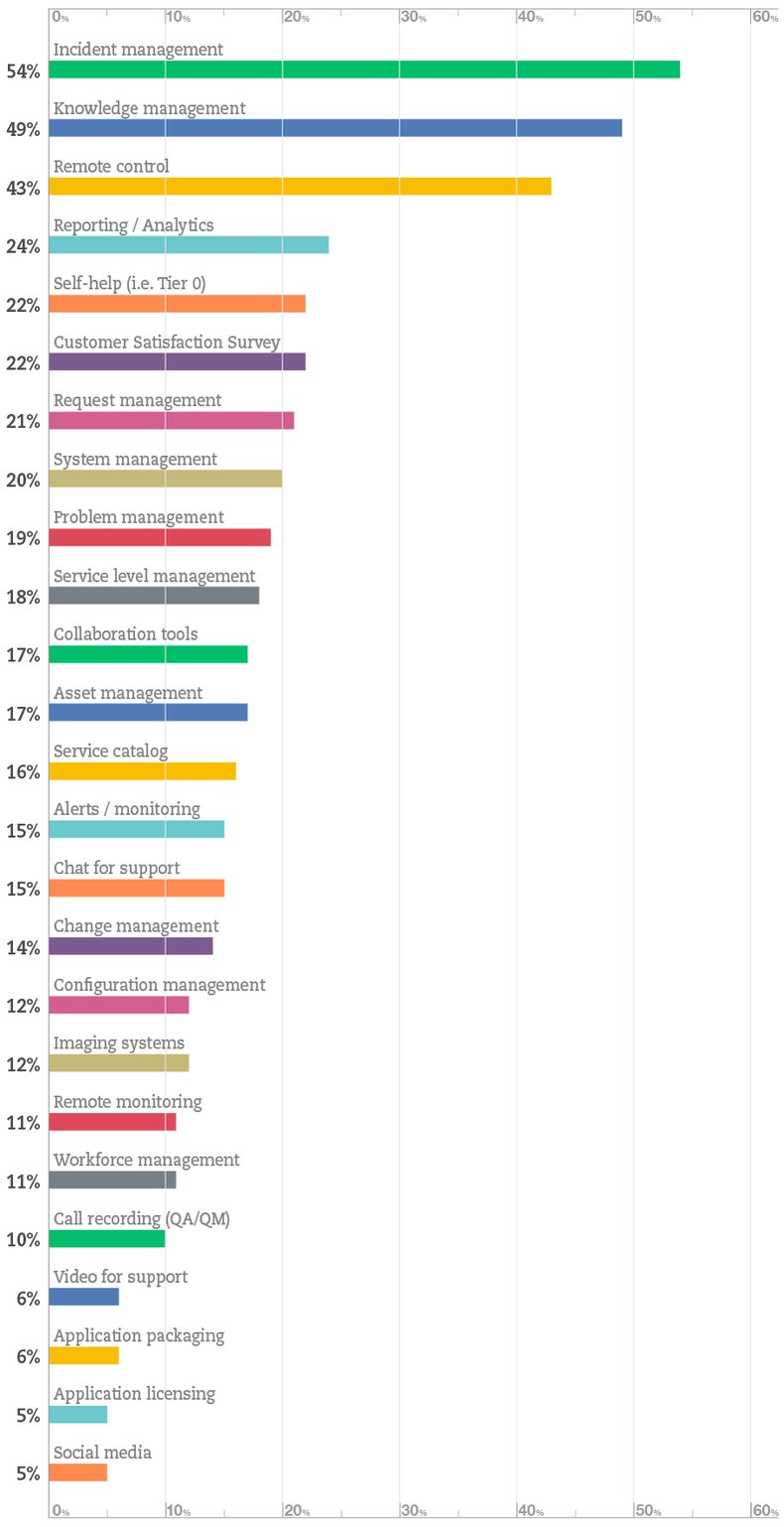Have you ever stopped to think about which of the many capabilities within your IT service management (ITSM) or IT service desk tool (or home-grown equivalent), and wider IT-management toolset are the most important for IT support? It’s pretty hard to do – to whittle everything you use down to a top 6 – and then the next question is: How does this map to the collective requirements of other IT organizations and their support capabilities. After all, most of us like to be vindicated in our choices.
Well fear not. The kind people at HDI have done the heavy lifting for you as apart of their annual mega-survey (but please note that, due to the geographic nature of HDI membership and reach, this reflects a mostly North American view of the IT support world).
Before you read on though, please take a moment to think how you would respond to the question – it will be fun to see how your answers match or differ from the survey results.
So, What are the Must-Have IT Support Technologies/Capabilities?
The 2017 Technical Support Practices & Salary Report shows quite a long tail (see the diagram below), but there’s a clear top 3:
- Incident management (54%)
- Knowledge management (49%)
- Remote control (43%)
With the top 5 rounded off with reporting/analytics (24%), self-help (22%), and customer satisfaction surveying (22%).
How does this stack up against your top 5?

Source: HDI, “2017 Technical Support Practices & Salary Report” (2017)
Deeper into The Results
Parking the top 5 (well, 6) for a moment, there’s some interesting observations to be made lower down the bar chart:
- The percentage-spread from position 7 through to 21 shows how widely views differ across the circa 600 people who completed the HDI survey – with these middling options all rating at between 10-21%. What does this tell us? Probably that the drivers, emphasis, and focus of IT support are varied across different organizations (and with this probably not just related to organizational size and industry, although operational maturity will no doubt have a part to play).
- Problem management and service level management – at 19% and 18% respectively – are reasonably high up the bar chart. It’s great to see that technology to support these activities is important to IT support, and perhaps their relative organizational importance could be assumed to be even higher when you consider that these might not be considered IT support capabilities by some of the respondents (and their organizations).
- Configuration management is unsurprisingly low down the list at 12% - it’s often considered “too hard.” But when added to the asset management score of 17%, maybe we can see the true IT-support value of knowing more about the IT infrastructure and what’s used for what and where.
- Social media is languishing at the bottom of the pile. A sign, if we actually need one, that the hype at the start of the decade around social support being the next big (IT support) thing was misplaced.
Now let’s return to the top 3 (as considering the top 5/6 would make this far too long a blog).
#1 Incident Management
While incident management is sitting pretty at the top of the pile, you might be wondering why it’s only considered important – in terms of the technologies that support it – to just over half of respondents. There are two possible causes worth mentioning, that:
- “Incident management” is an ITIL term and will thus not be one that many respondents are familiar with or, more importantly, something that these respondents consider themselves to be undertaking. North American adoption of ITIL, according to various industry surveys, is circa 55%, with the other circa 45% very likely to know incident management by the term “ticketing.”
- Incident management, by its very nature, is seen as IT support “table stakes” – and thus something that’s taken for granted by survey respondents when considering the capabilities that elevate their service desk’s performance. It’s a little similar to asking people what they need to go swimming, and getting a set of responses where swimsuit, towel, and goggles are ahead of water.
#2 Knowledge Management
On a personal note, it’s great to see knowledge management – or the technology that enables it – in second place just behind incident management.
There’s no question that the ITSM industry as a whole needs to get better at knowledge management and that knowledge management’s role and importance is growing to IT staff, end users (in terms of self-help, itself #5 on the list), and future artificial-intelligence use cases such as chatbots.
Hopefully this result is an indication that knowledge management, and the people changes required to truly make knowledge management effective, are being taken more seriously by IT support teams.
#3 Remote Control
In some ways, it wouldn’t have been surprising to see remote control in first place, and in the same HDI survey it’s listed as the most-adopted IT support technology, just ahead of incident management (but again, please refer to the ITIL-terminology point made above). Why wouldn’t people use a technology that can improve IT support across all three of speed, cost, and end-user experience?
As to why 10% of survey respondents don’t use remote control (again referring to another of the survey’s questions), there’s one obvious reason – all supported devices and people are located within the same building (or location). With a minimal time and cost impact of bringing IT support and the end-user/technology together, but a potentially big jump in end-user experience thanks to the very-personal, face-to-face, method of support provision.
So, what do you think about the most important technologies for IT support as listed above? What would you rate higher or lower? Please let me know in the comments.
About the HDI survey: All survey responses were collected via a web-based survey, open from August to September 2017. The 2017 report compiles the responses from 596 technical support professionals in more than thirty vertical industries.
.jpg)

